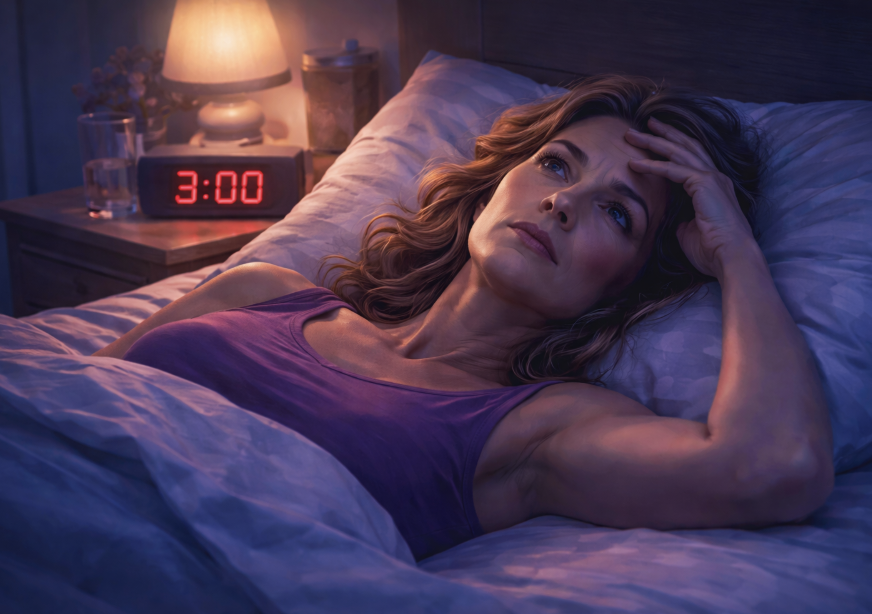
Can’t Sleep?
When I was a much younger doctor, my patients in their 40s would warn me about the impending insomnia.
“You just wait,” they’d say. I never thought it would happen to me—I’d always been a solid sleeper! And yet, at 44, I found myself wide awake between 2 and 4 a.m. most nights, staring at the ceiling and muttering, “Seriously?” Sleep struggles are one of the most common early symptoms of perimenopause—even before hot flashes make an appearance…These are ingredients I’ve used and recommended for over 20 years in integrative and functional medicine.

Progesterone: All Your Options, Clearly Explained
If you’ve ever been told, “You need progesterone,” and then immediately felt overwhelmed by the how, which, what dose, and why does everyone do this differently — you’re not alone. There are a lot of progesterone options. That’s both the good news and the confusing part. Most prescribers will tell you about one option but I want you to know all your options, why you might choose one over another, and how having (or not having) a uterus changes the conversation. One quick note before we begin: Yes, progestins exist. They are synthetic. They are used in birth control and some hormone therapies. That is not what we’re talking about today. This is about progesterone (like the kind in your body)…

Iron and Hair Loss: What No One’s Telling You
Is your hair getting thinner, drier, or just not the same after 40? Your thyroid is fine. Your hormones look okay (ish). And yet… you’re still shedding like crazy. Have you checked your iron? Like, really checked it the right way? Hair loss and low iron go hand in hand — and most women have no idea why. Let’s fix that. Here’s what’s wild: you can have “normal” labs — even a normal CBC (complete blood count) — and still be losing hair. Why?

Does Estrogen Live Forever?
You make estrogen. You might even take estrogen. But what does your body do with it once it’s done? Does it just hang around forever? How does it actually get out? That whole process is called estrogen metabolism (or detoxification), and it happens primarily in your liver, bile/intestines, and kidneys. And the best part? There’s a lot you can do to support it. Detoxification isn’t a once-a-year juice cleanse. It happens 24/7/365 — through birthdays, holidays, stress, and every “I’ll start Monday” moment. Think of detox like a bathtub: Phase 3 is the sewer line. Phase 2 is the drain. Phase 1 is the water coming in. You don’t open the faucet until you know the drain (and the sewer) are clear otherwise you get problems…
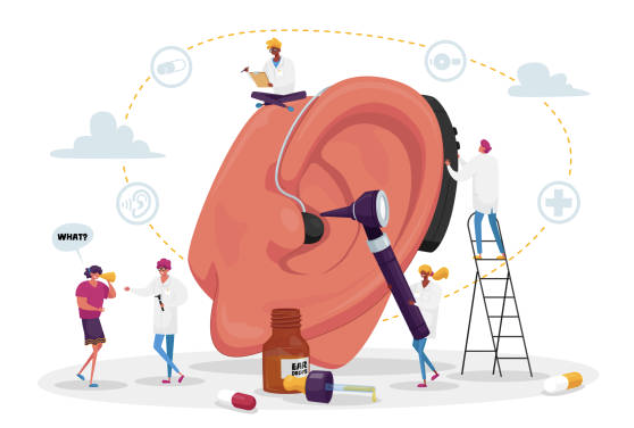
“Wait, What Did You Say?” — Why Hearing Loss Is the Dementia Risk Nobody’s Talking About
Let’s be honest: hearing loss is not exactly the sexiest topic in women’s health. We’ll talk about hot flashes, dry vaginas, and hormone patches before we’ll admit we’re saying “huh?” way more often than we used to. But here’s the thing: your hearing is more than just volume control, it’s brain protection. And ignoring those early signs of hearing loss might actually accelerate something much scarier than asking someone to repeat themselves… dementia. So, before you roll your eyes and reach for your readers, hang with me. This is one midlife health topic that actually deserves your full attention…
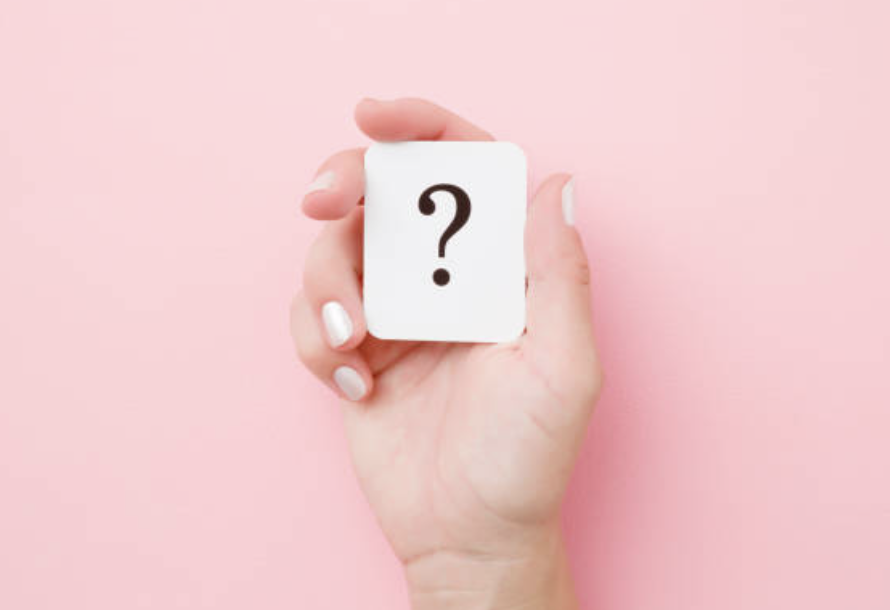
The 7 Biggest Myths About Hormones (That I Heard This Week Alone)
Hormones: they’re confusing, they're chaotic, and everyone seems to have an opinion about them, especially when you hit your 40s. This week alone, I heard seven persistent myths that made me want to scream into a bottle of progesterone. If you're on hormone therapy or considering it, these myths may sound familiar. Let’s set the record straight. Myth #1: You can’t start hormones until you’ve gone 12 months without a period…
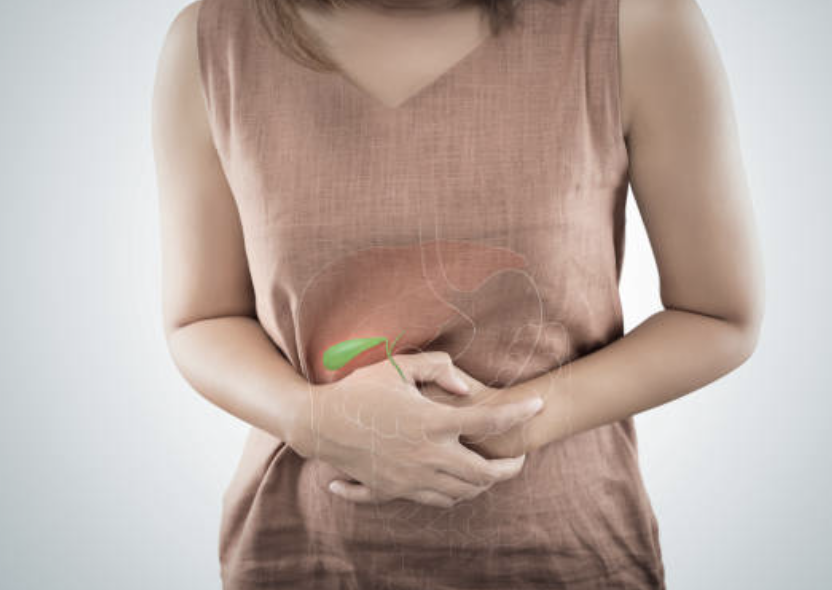
Estrogen And Your Gallbladder: Friend or Foe?
I love hormone therapy if you’re a candidate BUT they are not without risks. Gallbladder problems or disease is a big one if you’re taking oral estrogen. This includes estradiol or Premarin capsules for menopause or the synthetic estrogen in birth control pills. Your gallbladder is a badass. It helps you break down fats from your diet. It stores bile from your liver and releases it when needed. However, when things go wrong, it puts you at risk for gallbladder pain, inflammation, stones, and possibly even needing surgery! Knowing this, how do estrogens play a role?
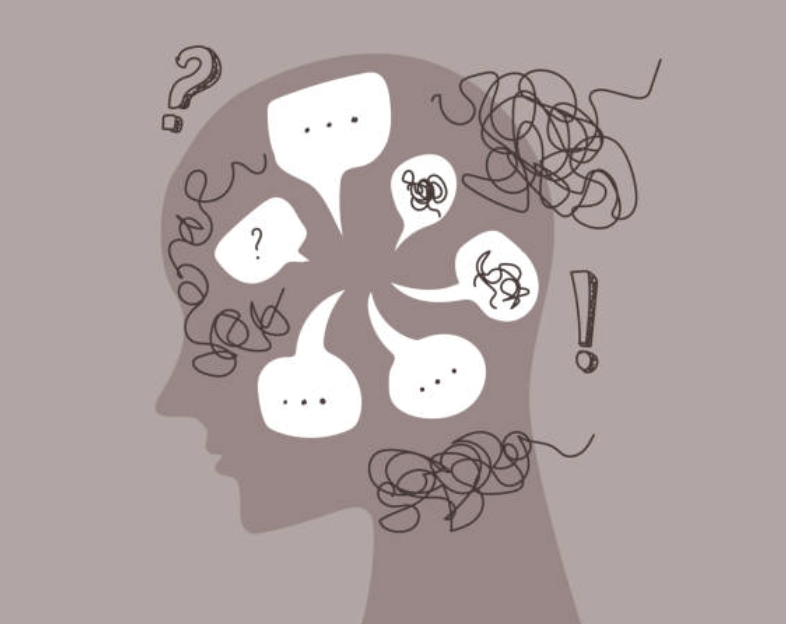
Are Stress and Anxiety the Same Thing?
No. They’re not the same but yes they’re very connected. In my experience, when you understand the why behind your stress or anxiety, it can dramatically ease the situation. So in this article, we’re going to break it all down: how your nervous system work, what stress actually is, the three major triggers I see in women over 35…

Hormones And Heart Disease: Why You Should Care
Despite being the number one killer of humans, heart disease isn’t sexy. Most people tune out when it comes up—and I get it. But because it is the number one killer, I do need you to pay attention, at least sometimes. Your heart health directly impacts your health span. Plus heart health is a category you don’t usually feel until it’s too late, unlike hot flashes. What Is Heart Disease? “Heart disease” refers to a group of conditions that affect the heart and blood vessels, including…
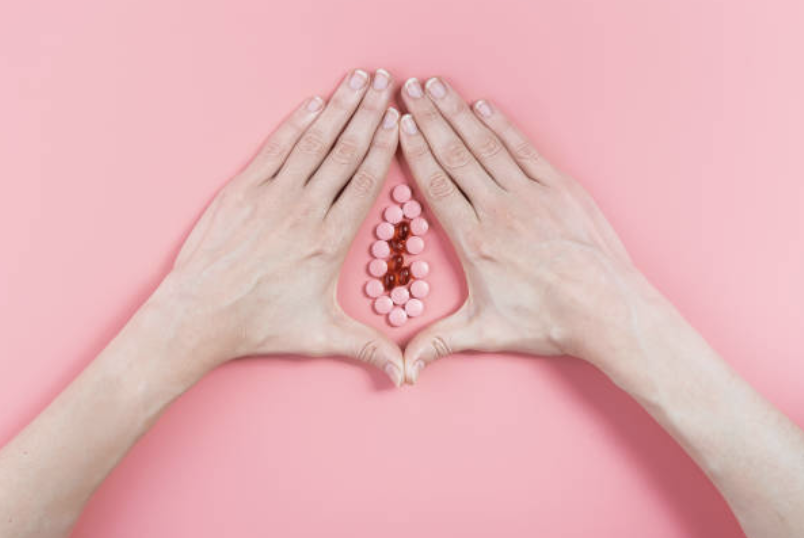
Updated Guidelines for “Down There”—Listen Up!
I love when updated medical guidelines finally catch up to what women have been complaining about for years—especially when it comes to what’s happening “down there.” So if you're experiencing dryness, pain, irritation, or leaking when you sneeze (seriously, the betrayal), you’re going to want to listen up. The American Urological Association just released its 2025 guidelines on Genitourinary Syndrome of Menopause (GSM)—and they’re worth celebrating…

Vaginal Estrogens, The Black Box Warning and You
I was in Rite Aid the other day searching for band aids. The first aid care section is right next to the pharmacy window (nothing awkward there) where a woman was telling the pharmacy tech how excited she was for her new estrogen for “down there.” Since it was a new prescription, she had to talk to the pharmacist who handed her what looked like a huge print out of information and said, “Before I explain how to use this, please know there is a black box warning on it for cancer.” I walked away. I had found my band aids and knew what would come next…

Low Melatonin, Hot Flashes, and Blood Sugar
Melatonin often gets billed as the “sleep hormone,” but that’s just scratching the surface. While it’s made in multiple places in the body, the melatonin produced in your brain’s pineal gland is the one that really gets around—it enters your circulation and influences everything from your temperature regulation to your metabolism. Here’s something fun: your body’s internal clock isn’t perfectly 24 hours. It runs a little short or a little long depending on the person. So every day, you have to reset your circadian rhythm—your internal timekeeper—using light, dark, and hormonal cues…
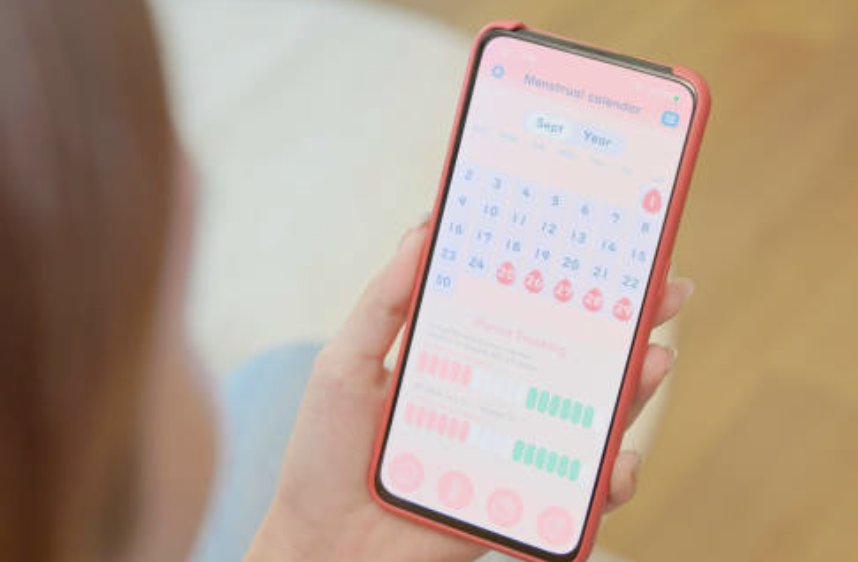
Your Period Changed by 3 Days and Your Doctor Said 'It's Fine' - Is It?
Let me guess. You walked into your doctor's office with your period tracking app pulled up, ready to talk about how your usually reliable 28-day cycle has shifted to 25 days. You've been paying attention. You know something's different. And what did you hear? "That's still within normal range" or "you're still getting your period, so it can't be perimenopause." I’m sorry what? Your menstrual cycle is a vital sign…

5 Reasons Your Testosterone Is Low
I love testosterone. Sure, too much can lead to acne, chin hair, and other not-so-fun side effects—but too little, and you might find yourself struggling with muscle loss, low libido, and a flat mood. Testosterone isn’t just a "male hormone"; it's a major player in women's health too. And here’s the kicker: testosterone naturally declines with age—but not only because of menopause. I’ve seen women in their 30s with very low levels and women in their 50s holding steady. Yes, it tends to drop with age, but it’s not a clear-cut, one-size-fits-all situation…

Should You Be Taking Testosterone?
Should you be taking testosterone? When’s the right time?Wait… am I on testosterone? These are questions I get all the time—and fair enough, because there’s a whole lot of confusion (and misinformation) floating around about this hormone. So let’s clear a few things up. First Things First: Yes, You Have Testosterone…

Can You Still Have Regular Periods and Be Perimenopausal? Let’s Talk About It.
A few weekends ago, while visiting my parents (and apologies to all my Atlanta friends—this was a very quick trip!), my mom asked me point blank: "Are you menopausal yet?" She didn’t go through menopause until she was 54 years old. Turns out, her mother also went through it later. At the time of this writing, I have just turned 48. My cycles are still regular—but I’m absolutely feeling the perimenopausal symptoms creeping in. I’m sharing this because it’s a question I hear a lot—including recently on…

4+8=12 Things For My Birthday
June is a big month for me because it’s my birthday month. I absolutely obsess over my birthday and always have. I celebrate it ALL. MONTH. LONG. Because, why not? #GeminiEnergy This year I turn 48yo (hence the 4+8) and I wanted to give you some personal insight into where I’m at, what I’m doing, and what I’ve learned.
Where I’m at:
I still have regular periods and I still ovulate! And yes, I still take…

How to Support Your Lymphatic System (Without Buying a $400 Device Off Instagram)
So your lymphatic system might be feeling sluggish—and now you're wondering: What can I actually do about it?Good news: you don’t necessarily need to buy fancy tools, spend hours dry brushing, or commit to a cabbage-only diet. Supporting your lymph system is surprisingly simple, totally doable, and insanely helpful for your energy, skin, hormones, digestion, and inflammation. Here’s what I recommend as your go-to lymph flow toolkit…

Feeling Puffy, Swollen, or Sluggish? It Might Be Your Lymphatic System
Have you been feeling stuck in your health lately? Like... literally stuck—sludgy, swollen, puffy, slow, or just kind of blah? Sure, you could blame your hormones (we often do), but you might want to zoom out and look at your lymphatic system—that under appreciated, unsexy, yet wildly essential part of your health that rarely gets the spotlight. Spoiler alert: it's not just the swollen lymph nodes in your neck when you're sick. The lymphatic system is a whole-body network, and when it’s not working optimally, you feel it everywhere. Wait, What Even Is the Lymphatic System? Think of it like your body's inner drainage and cleanup crew. You’ve got 450 to 800 lymph nodes (yes, really)…

Midlife Acne and Body Odor? It’s a Hormone Thing (and I’ve Got a Secret Weapon)
If your skin and body odor have gone a bit rogue in midlife, you’re not losing your mind. Seriously—welcome to the hormonal chaos that is perimenopause and menopause. Here’s what might be happening. When estrogen drops faster than testosterone, your body may perceive you as having “more” androgens (aka the hormone family that includes testosterone). And when androgens take the lead, you can start feeling like a teenage boy again: Breakouts. Oily skin. Body odor. WTF…
